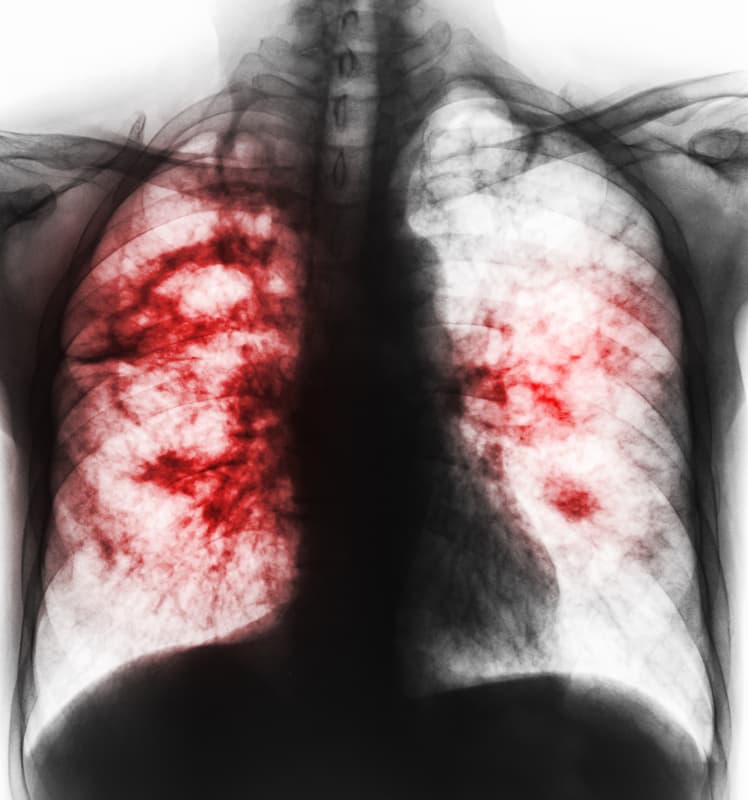New genetic mutation linked to tuberculosis susceptibility challenges understanding of TNF’s role in immunity
Researchers at The Rockefeller University have identified a rare genetic mutation that increases vulnerability to tuberculosis, potentially reshaping our understanding of tumour necrosis factor’s role in the immune system.
Tuberculosis (TB) remains the leading cause of death from infectious disease globally, yet it’s estimated that fatalities represent only about 5% of infections with Mycobacterium tuberculosis (Mtb). This disparity between infection rates and severe outcomes has long puzzled researchers, with growing evidence pointing to genetic factors as a key determinant of TB susceptibility.
A new study, published in Nature on 30 August 2024, has uncovered a rare mutation in the tumour necrosis factor (TNF) gene that significantly increases the likelihood of developing active TB. Intriguingly, carriers of this mutation do not appear to be at increased risk for other infectious diseases, challenging long-held assumptions about TNF’s broad role in inflammation and immunity.
The unexpected specificity of TNF deficiency
The research team, led by Stéphanie Boisson-Dupuis and Jean-Laurent Casanova from The Rockefeller University, investigated two cousins from Colombia who had experienced severe, recurring TB infections despite otherwise normal immune function. Whole-exome sequencing revealed that both individuals carried a mutation in the TNF gene, which was absent in their extended family members.
TNF, a pro-inflammatory cytokine primarily secreted by macrophages, has long been considered a crucial component of the immune response. It plays a role in various biological processes and has been implicated in conditions such as septic shock, cancer, and rheumatoid arthritis.
Dr Casanova, head of the St. Giles Laboratory of Human Genetics of Infectious Diseases, commented on the findings: “The past 40 years of scientific literature have attributed a wide variety of pro-inflammatory functions to TNF. But beyond protecting the lungs against TB, it may have a limited role in inflammation and immunity.”
Mechanism of increased TB susceptibility
The researchers discovered that the TNF deficiency caused by the genetic mutation impairs a specific immune process in the lungs. Without functional TNF, alveolar macrophages fail to produce reactive oxygen species (ROS) through the respiratory burst mechanism, which is crucial for destroying ingested pathogens.
This localised impairment leaves the lungs particularly vulnerable to Mtb infection, while other parts of the immune system remain largely unaffected. The findings explain why the study participants were repeatedly hospitalised with severe lung conditions but showed no increased susceptibility to other infectious diseases.
Implications for current treatments and future research
The discovery sheds light on a long-standing question regarding the increased risk of TB associated with TNF inhibitors, which are commonly used to treat autoimmune and inflammatory diseases. The study suggests that by blocking TNF, these treatments inadvertently disable a key defence mechanism against Mtb in the lungs.
Dr Boisson-Dupuis emphasised the surprising nature of their findings: “It’s very surprising that the people we studied are adults who have never been sick with other infectious diseases, despite being repeatedly exposed to their microbes. They are apparently selectively at risk for TB.”
Rethinking TNF’s role in immune function
This research challenges the prevailing understanding of TNF’s broad importance in immune function. The findings suggest that while TNF is crucial for immunity against Mtb, it may be redundant for defence against many other pathogens.
Dr Casanova posed a critical question arising from their work: “What other pro-inflammatory cytokines are doing the jobs we thought TNF was doing? If we can discover that, we may be able to block these cytokines rather than TNF to treat diseases where inflammation plays a role.”
Potential for new treatment approaches
The study’s implications extend beyond TB research, potentially opening new avenues for treating inflammatory disorders. By identifying the specific cytokines responsible for various inflammatory processes, researchers may be able to develop more targeted therapies with fewer side effects than current TNF inhibitors.
Continuing the search for genetic factors
This study is part of an ongoing effort by Casanova’s lab to uncover genetic causes of TB susceptibility. Over the past two decades, they have built a database of whole-exome sequences from more than 25,000 people worldwide, including approximately 2,000 TB patients.
Previous research from the team has identified other rare genetic mutations that increase vulnerability to TB and other mycobacterial infections. For instance, mutations in the CYBB gene were found to disable the respiratory burst mechanism throughout the body, leading to susceptibility to a wide range of infectious diseases.
The findings from this study not only advance our understanding of TB pathogenesis but also challenge fundamental assumptions about immune function. This research may lead to a significant reassessment of how we approach both TB treatment and the broader field of inflammatory disorders.
Reference:
- Boisson-Dupuis, S., et al. (2024). TNF deficiency impairs pulmonary immunity to Mycobacterium tuberculosis. Nature. https://doi.org/10.1038/s41586-024-07866-3


